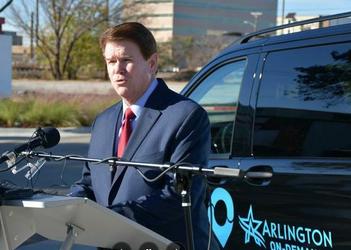
ARLINGTON, Texas, February 23, 2018 (ENS) – Public transit officials in cities across the United States are trying to find ways for ride sharing to complement existing public transit options or those in the development pipeline, while others worry that ride sharing could replace public transit altogether. That shift is already starting.
A recent survey conducted by the University of California, Davis found that ride sharing services resulted in a six percent reduction in Americans’ use of bus systems and a three percent reduction in Americans’ usage of light rail services.
Studies of New York and other cities suggest that Uber, Lyft, and other app-based car services are increasing congestion and air pollution by facilitating a shift away from mass transit.
But some independent-thinking cities are offering on-demand ride sharing as an alternative to high-cost rapid transit.

One of the first in the United States is Arlington, Texas, a growing city of 380,000 people located between Dallas and Fort Worth.
Last December, in partnership with the Via rideshare service, Arlington began a pilot program supported by the Arlington City Council and the citizen-led Transportation Advisory Committee.
The rideshare pilot replaced the Metro Arlington Xpress commuter bus line, which was taken out of service on December 31, 2017.
The Via service area initially covers downtown Arlington and the City’s Cultural Arts District, the University of Texas at Arlington, the Entertainment District, and the area around Arlington Memorial Hospital. Summer expansion plans call for coverage of the airport, commuter train stations and major retail destinations.
Customers can book a seat in a six-passenger Mercedes-Benz van through the Via app or by phone, and Via’s sophisticated technology can match them with others going their way in a kind of riadesharing car pool. Wheelchair accessible vehicles are available. Rides are $3 per trip.
The contract is for one year, with four one-year renewal options. The City of Arlington will pick up one-third of the pilot project’s cost, about $322,500, with the rest coming from the Federal Transit Administration.
Data collected through the rideshare pilot will help shape the City Council’s future transport planning decisions.

“We are at the beginning of an exciting transportation technology revolution,” said Mayor Jeff Williams. “Arlington’s Via Rideshare Pilot Program is the latest example of our city’s willingness to explore innovative transportation technology solutions for our residents, employees, students and visitors.”
Arlington also will be a test city for self-driving cars. The U.S. Department of Transportation has named Texas a national Automated Vehicle Proving Ground for the testing of connected and automated vehicle technologies.
Automated vehicles aren’t the only type of innovative transportation technology being explored in Arlington.
In January, the city announced a data-sharing partnership with Waze, the free, real-time crowd-sourced traffic and navigation app powered by the world’s largest community of drivers.
Designed as a free, two-way data share of publicly available traffic information, the Connected Citizens Program promotes greater efficiency, deeper insights and safer roads for the drivers of Arlington along with more than 100 other partners around the world.
